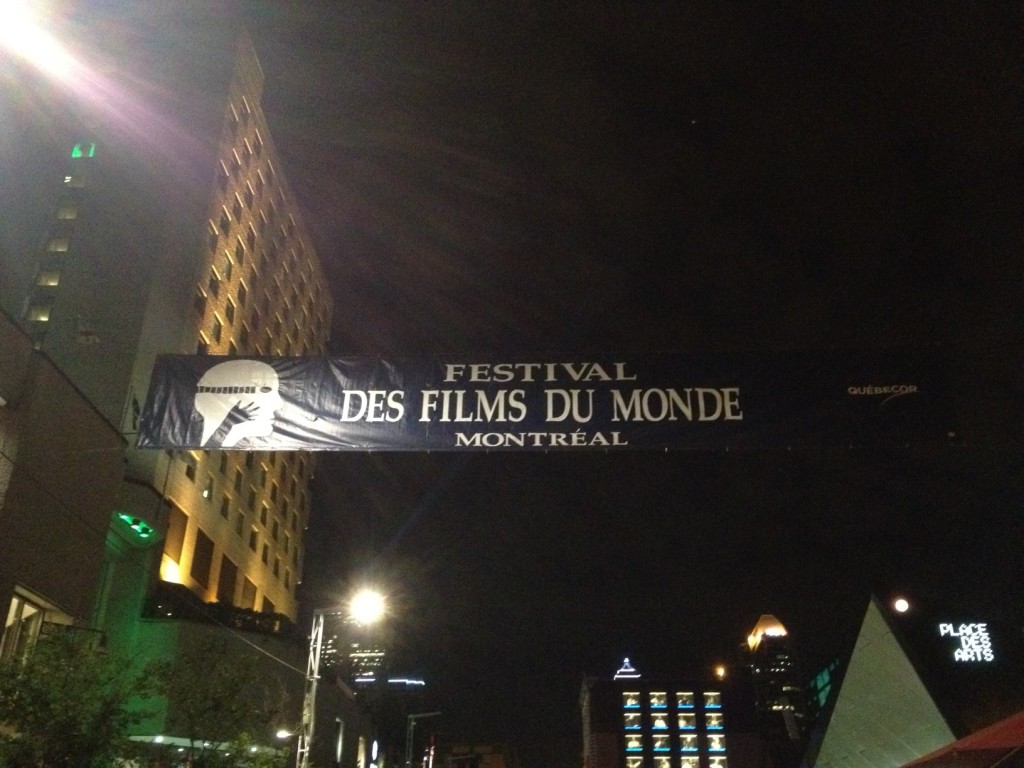Reviews include Civil War, In Flames, and The Greatest Hits.
FIPRESCI Diary: Festival des Films du Monde, part one
August 28, 2014
By: Jake Howell

The 38th Festival des Films du Monde (FFM) opened on August 21st, presented with an evening screening of Claude Lelouch’s Salaud, on t’aime. It’s a decent movie about growing old and coming to terms with the choices you’ve made in life, and it features a strong performance from Johnny Hallyday, one of France’s biggest superstars. Though as much as I’d like to write about Lelouch’s film (it’s more or less a safe choice for an opening night selection), the fact that the festival is even happening at all is the real story here. I’ve only been in Montreal a week, but it’s clear to me FFM is unlike any festival I’ve ever attended, which is simultaneously both refreshing and eye-opening.
To make a long story short, there were persisting rumours throughout the summer that this festival—the only competitive film festival in North America accredited by the Fédération Internationale des Associations de Producteurs de Film—was more or less approaching its final year. As La Presse‘s opening night coverage explains, FFM recently lost a major portion of its funding, and as a result, the future of the festival is the topic du jour I hear people talking about the most, not the merits of the actual films that are actually being screened.
From what I’ve gathered speaking to locals and fellow industry delegates, Montreal’s Festival des Films du Monde will likely take place again in 2015, but future installments may be refocused to highlight primarily French language cinema. Depending on whom you speak to here, the Toronto International Film Festival is cited (usually cynically) as an event that has been entirely courted by Hollywood and the North American film industry at large, and after years of fighting a losing battle, Montreal isn’t interested in playing that game anymore. Case in point: many of the foreign-language films I have been tasked to watch are without English subtitles, and it’s a good thing I have a cursory grade-school understanding of written French—that, and of course I am fluent in the powerful visual language of cinema, which is universal. I feel lucky I can get through these films grasping the majority of the narrative, but other English-only writers may feel incredibly alienated, which should effectively underline the priorities of this festival.
It remains to be seen how moving away from English-language cinema will play out. En fait, there are members on FFM’s Board of Directors who think ignoring the North American industry is a poor idea, which further clouds the outlook for what will eventually culminate. As someone said to me at a seriously low-key Happy Hour the other day, “you picked an interesting year to come to this festival.” No kidding. Montreal is a great city, and a great city deserves a great film festival. There are adjustments to be made—that is the consensus from everyone involved here—but it would be incorrect to suggest this festival is simply dying. As someone described to me, “FFM is a phoenix, and next year it will be reborn.”
As I run from screening to screening here, one thing that I realize I have taken for granted is the buzz of a festival—festivalgoers recommending, condemning, talking about, raving about, and hating on movies. Critics sometimes use the word buzz disparagingly or perhaps at least tongue-in-cheek, although it was never plain to me how fundamentally important buzz is to a festival until you’re at one without any. Happening literally footsteps away from FFM are a number of other events (there is an unrelated music stage, a fashion promenade, etcetera), and it’s hard to tell who is here for what (save for the Montrealers who attended “Otakuthon,” a huge nearby anime convention that afforded me some lovely elevator rides with people wearing some eyebrow-raising costumes). There are so many events, in fact, that when I checked into my hotel that hosts FFM and said I was “here for the festival,” the receptionist asked me which one. That may have been ignorant of me, but just the same, it’s apparent that FFM is not the city-defining event that TIFF or Sundance has become. I’ve yet to encounter any volunteers representing the festival, and when it comes to movie recommendations, I’ve only had one overly-refreshed gentleman tell me that the film he saw before hitting the bar was “pretty good.”
I see now that buzz is very real and utterly vital to festivals. Take Cannes, where standing in line and chatting with other critics is something that can absolutely change the tide of a day, especially when you continue to hear about films in other sections you may not be paying attention to. David Robert Mitchell’s It Follows is one of those movies at Cannes 2014 where you couldn’t stand in a line without someone talking about it, and that kind of discussion—or hot tip—is sorely missing in Montreal (catch It Follows at TIFF’s Midnight Madness this year). In Montreal, there are no lines to queue in (not necessarily a bad thing for a critic, I suppose), there are very few extracurricular events (read: parties) to attend, and there’s certainly nothing here like Le Petit Majestic, the infamous Cannes alley bar that has become the nightly congregation center for ex-pats who want to drink on the street and mingle after a day of screenings. In total, I’ve met only a handful of other writers.
To wit, though the FFM schedule is stuffed with films, there isn’t much happening around the festival aspect of the term “film festival,” and it’s downright bizarre. In the same vein, even the oft-maligned element of Twitter—that possibly reductive phenomenon where people tweet off-the-cuff reviews of intricate art films—is something I find myself wishing for, because it’s simply not happening at FFM. In the past, I’ve found the act of broadcasting a hashtag to be a little odd and in-your-face, but the alternative, I now see, is digital silence. In terms of signage and the colleagues here I follow on social media, I haven’t seen a single hashtag that represents FFM, and a few basic searches on Twitter itself don’t reveal much of interest.
Regardless, Montreal still has literally hundreds of movies to consume (the festival’s poster this year is man eating a piece of celluloid), and while every screening I’ve attended here has plenty of empty seats, there is accomplished cinema to experience. I can’t write much about what I’ve seen—I’m staying quiet until we award a FIPRESCI prize in the First Features category—but there’s enough to see here that is worthy of larger audiences.
From an event that is in a unique state of flux, à bientôt.




